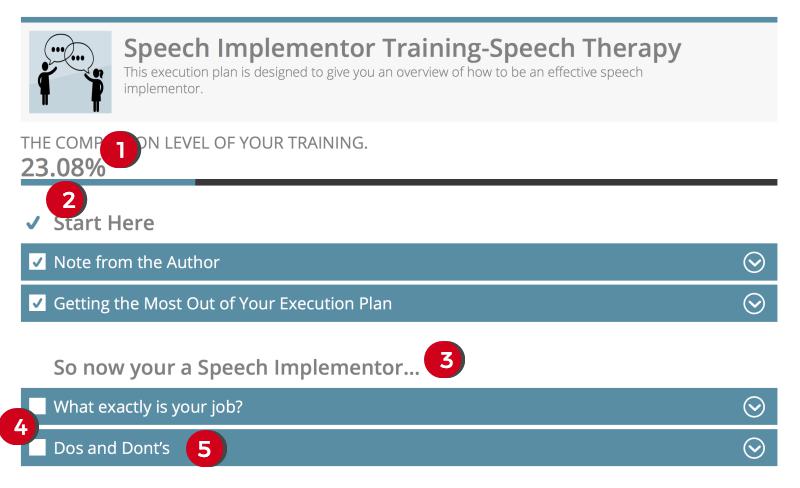
SLP-A & Speech Implementor Training- Communication with SLP
Start Here
Note from the Author
I’ve been in working in speech-language pathology since 2004 and I’m thrilled to be your guide throughout this Execution Plan.
While working in a hospital setting, schools, and private practice I’ve worked with children with all sorts of disorders, syndromes, and delays.
I have worked with speech implementors the past ten years and have developed our systems in such a way that folks without any background in communication disorders, special education, or even regular education can implement our plan and achieve successful outcomes with students.
Use what you learn in this Execution Plan to plan to have high-quality therapy sessions, effective communication with other IEP team members, and feel confident about your ability to help your students.
Ready?
Let’s get started!
Dan McCool
Owner/Speech-Language Pathologist
Ozark Therapy Institute, LLC
How to get the most from this Execution Plan
Here’s how to get the most out of the content in this Execution Plan,
- Read the entire EP once – Read through this entire EP, watch any videos and download the resources. Don’t execute on the steps until you have finished reading the entire EP. This will help you understand the progression of the steps and put them into context.
- Complete the steps – This Execution Plan is a checklist. Each step builds upon the next. Complete each step in order.
Lastly, here’s how to use the Execution Plan interface.
View the example Execution Plan below…

- Progress Bar – The Progress Bar shows you the percentage of the Execution Plan you have completed.
- Check boxes – Click the check box to indicate completion of a Course Step or Course Section.
- Course Sections – An Execution Plan is a series of steps that lead to the completion of milestones. In this EP there are four milestones entitled Start Here, Pre-Launch, Launch and Post-Launch.
- Course Steps – Each Course Section contains multiple steps.
- Arrows – Use the Arrow Buttons to open and close the Course Steps in the Execution Plan.
Communicating with the SLP
Weekly Consult
Scheduling Weekly Consult Meetings
Weekly consults with the SLP, are not optional but are a necessary components in the Ozark Therapy Implementor Supervision System. The method meeting can take several forms. It can happen in person, as a video conference, or phone call. If the implementor has a full caseload of students, approximately 1 hour should be allotted each week for consultation. If an implementor has less than a full caseload, the time for meeting may be adjusted accordingly.
It is usually easiest to have the weekly consult on the same day, at the same time each week. If a meeting is missed due to unforeseen circumstances it should be made up as soon as possible, but no later than 1 week after it was originally scheduled.
What to expect from the SLP
When you work with an SLP from Ozark Therapy you can expect a lot from us:
We will observe you doing therapy from time to time-
Since the supervisor is ultimately responsible for what happens in a therapy session, it is necessary that we see what you are doing and how you are doing it.
We expect you to observe us doing therapy, consulting with teachers and administrators, and talking with parents-
These are activities that you will be doing on a regular basis. It is always easier to complete an activity after you have seen it done.
We will have a weekly consult-
During the weekly consult we will go over the status of 1/4 of your student caseload. During this meeting you can expect the SLP to give our opinions/impressions on a student’s performance and give you direction on how therapy should proceed.
We will clearly, but kindly, tell you if you do something wrong-
Nobody wants to do things the wrong way, but it makes matters worse if you are not given clear instruction on what needs to be done to fix the problem. We believe that to be unclear is to be unkind.
We will jump in when you need help-
If you need help with documentation, doing therapy, scheduling, talking with teachers, etc. we will doing everything we can to help you be successful.
We will write all of the Speech and Language Portions of an IEP or evaluation-
Speech Implementors should never be asked to write and evaluation or develop/revise an IEP. By law, this responsibility must be handled personally by a speech-language pathologist.
We will review all quarterly progress notes-
We will usually need your help in writing quarterly progress notes for each student. However, since the SLP is ultimately responsible for all communication related a child’s speech and language goals, the SLP must review (and edit if necessary) all progress notes.
What the SLP expects from the Implementor
We try to be very clear and up front in our exceptions of any Speech Implementors that we supervise.
We expect…
You will tell us if you are having a problem with a student (or even a teacher).
We stink at reading minds, and if you don’t tell us about a problem, we probably will remain in the dark.
You to prepare for therapy sessions-
Please do not try to “wing it” in a therapy session. That usually does not turn out very well (or at least it doesn’t go as well as if you had prepared). Sometimes you may be lucky to get 5 minutes of preparation for a therapy session, but that 5 minutes can make a huge difference in the effectiveness and excellence of the therapy session.
You to be prepared for weekly consults with us-
Being prepared means that you have entered the data on the appropriate students into the monthly tracking sheet on Google drive. We simply will not have enough time to enter data during the meetings.
See all the students according to your schedule-
You will be creating your schedule (with help from us if necessary). We ask that you stick to the schedule because teachers and students need predictability. Often, teachers plan when they teach certain subjects so that students that come to speech therapy can be present for the instruction. If you need to occasionally change your schedule, that is to be expected. Just let the SLP and the teachers know.